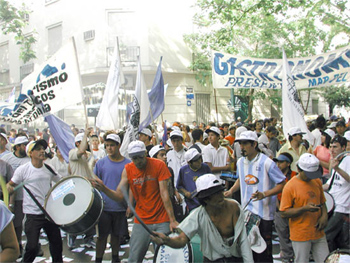The general secretary
of the Union of Tourism, Hotel and Food Service Workers of Argentina (UTHGRA),
José Luis Barrionuevo, demanded “a 30 percent salary raise for workers in the
industry,” and announced that they would be holding “escraches (public
exposures) within a week’s time against the evading and slave-driving employers”
who are benefiting from the growth in tourism.
In the night of Wednesday the 18th,
the unionist chaired a meeting of delegates at UTHGRA central
headquarters, where he declared that “after conducting several economic and
salary studies, we have determined that food industry workers are due an
immediate 30 percent increase,” and said that they will present a formal demand
to the business sector as soon as negotiations begin.
The unionist and national
congressman for the Justicialista Party also informed
SIREL that “In the next few days, we’ll make public a list of companies
where workers put in 12-hour workdays but are paid half wages.”
Barrionuevo
indicated that “the food service establishments that work ‘half days’ and evade
all kinds of contributions are located precisely in the most exclusive areas of
Buenos Aires, which are also the districts that attract the largest number of
tourists: Puerto Madero, Palermo Hollywood and Las Cañitas.
He further denounced that there are several other companies with these same
practices in La Plata, the capital of the province of Buenos Aires and a city
with significant student activity.
After highlighting that they’ve
“identified” all the infringing establishments, the unionist stressed that “there
are 58,000 workers nationwide working under this slave-driving half-day regime.”
Asked by the reporter if the wage
issue had been discussed during the Wednesday 18 trade union meeting held at
UOCRA (Construction Labor Union) headquarters, Barrionuevo assured
that “Hugo Moyano was clear on this: at the joint committee meetings each
participant discusses the issues they feel are important to their union and
membership.”
|

UTHGRA
mobilized for wages - Buenos Aires, November 2005 |
With regard to whether the
possibility of demanding an increase in the minimum, vital and mobile wage had
been evaluated at that meeting, Barrionuevo explained that “before we go
back to the CGT Governing Council we need to have a well thought out work
agenda.”
They worked on that agenda that
night, but according to the general secretary of the UTHGRA, they’re
going to put the finishing touches on it next week, and then a meeting of the
CGT Governing Council will be held “to communicate the conclusions to
workers throughout the country,” he said.
Lastly, consulted as to whether
he was optimistic about obtaining the 30 percent raise, he declared: “I’m
hopeful we will get it, as employers are earning a lot of money from national
and international tourism, and if they want to continue making a profit, they
will have to agree to our demand.”
Exponential
growth in tourism
That same Wednesday, shortly
before the meeting, the Secretary of Tourism acknowledged that Barrionuevo
was right, by announcing that thus far this year close to 600,000 tourists had
come to Argentina, representing an increase of almost 20 percent as compared to
the same period of 2006. What’s most notable about this tourist influx is that
the majority of the travelers come from the United States, a country that
did not previously have a strong tourism connection with Argentina, but
whose visitors are now growing annually in numbers and usually have a high
purchasing power.
Next on the list are tourists
from neighboring countries: Brazil and Chile; and in fourth place,
from Spain, whose travelers are also coveted by international tourist
destinations. With the figures at hand, National Secretary of Tourism Enrique
Meyer predicted a promising 2007, stressing “the industry’s current position
in the international context.”
The new
immigrants
The origin of these tourists is
actually not all that surprising. US and Spanish tourists are leading a wide
range of “new immigrants,” which are coming to Argentina, known as
“expats” (for expatriates). They don’t come from poor countries, nor have they
been chased away by armed conflicts, dictatorships or hunger, like in the past.
They come instead from the United States and major European
countries; and they disembark mainly in Buenos Aires, attracted by the cultural
scene and the favorable exchange rate.
Unlike our grandparents, these
“VIP” immigrants don’t live in conventillos (tenements), but rather in
modern renovated houses, preferably in districts like San Telmo and Palermo
“Soho” or “Hollywood” (which are the names coined to reflect the cultural offer
in the first case, and the number of movie production companies in the other).
The
phenomenon has gained such importance that it has even made it into the pages of
Newsweek magazine, with a piece on Buenos Aires,
The Capital of
Cool, which explains
this new migration trend. You have only to walk down a couple of blocks to run
into some of these young, and not-so-young migrants: students, writers, artists,
filmmakers; you see them going to the supermarket, riding the bus or the subway,
but purchasing ten times as much as the average Porteño. Not one of the hundreds
of restaurants in Palermo is empty at any time of the night, any day of the
week.
All of this is at odds with the
labor exploitation policy that these food industry establishments subject their
workers to. It is for this reason that Barrionuevo and his trade union
will charge their guns especially against all these restaurants: because of
their huge profits and “slave-driving” policy towards workers.
|
In Buenos Aires,
Javier Amorin
© Rel-UITA
April 20, 2007 |
 |
|
|
Photos:
Rel-UITA
Volver
a Portada